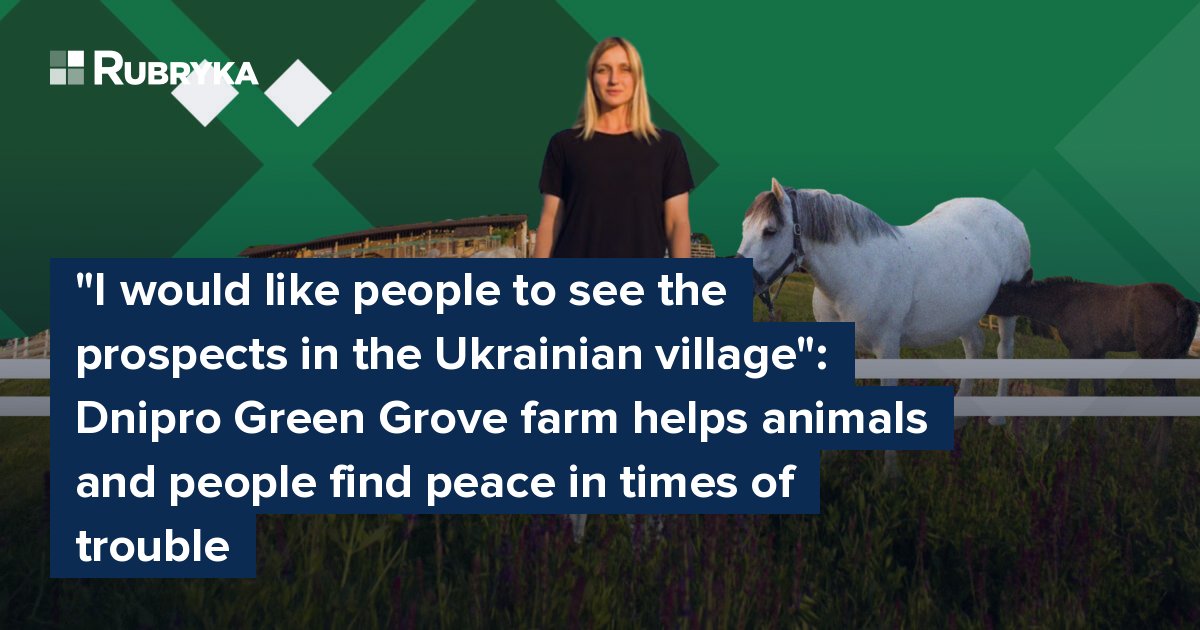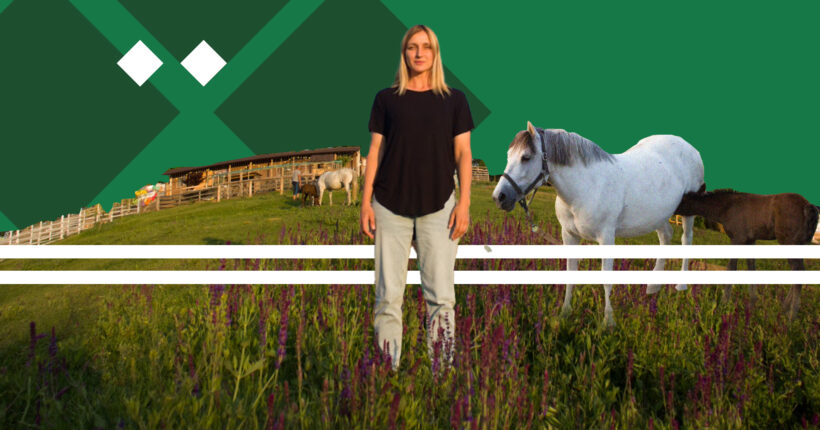
Ten hectares of peace
Not far from Dnipro, where Hollywood ends, Green Grove begins. (It's not a joke, there really is such a sign there.) These ten hectares of the Ukrainian village are a home to a whole family, a cheese factory, a carbon farm, a place for camping or a wedding – but most importantly, a shelter for hundreds of animals and people.
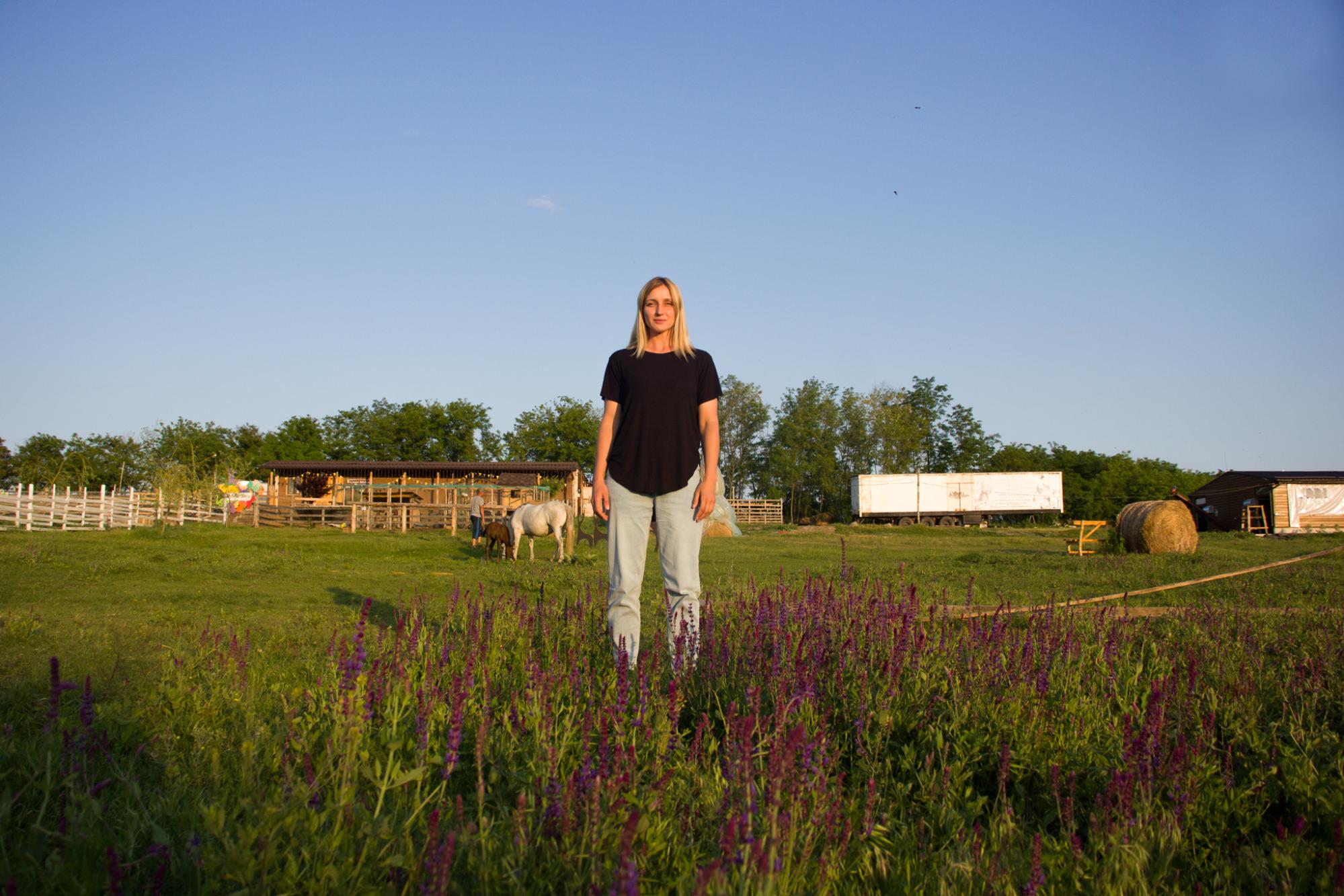
"Will you collect sage? Yesterday was Trinity Sunday, and it is just the time for that," says Movchanova
Zhenya Movchanova, the owner of the Green Grove, shows purple spikes, which are plentiful on this land, and willingly gives a tour of the farm. Animals graze on meadows near small buildings and pens. We pass a mare with a foal, which is a few days old. It greedily sucks its mother's milk, swaying on long thin legs. Movchanova warns that the young mother is not in the mood to communicate with strangers.
"The baby was named Shelby. She does not leave her mother. The donkey Mamunya may be sleeping somewhere nearby — she likes to lie in the grass. Mamunya freely moves around our farm," Movchanova shares.
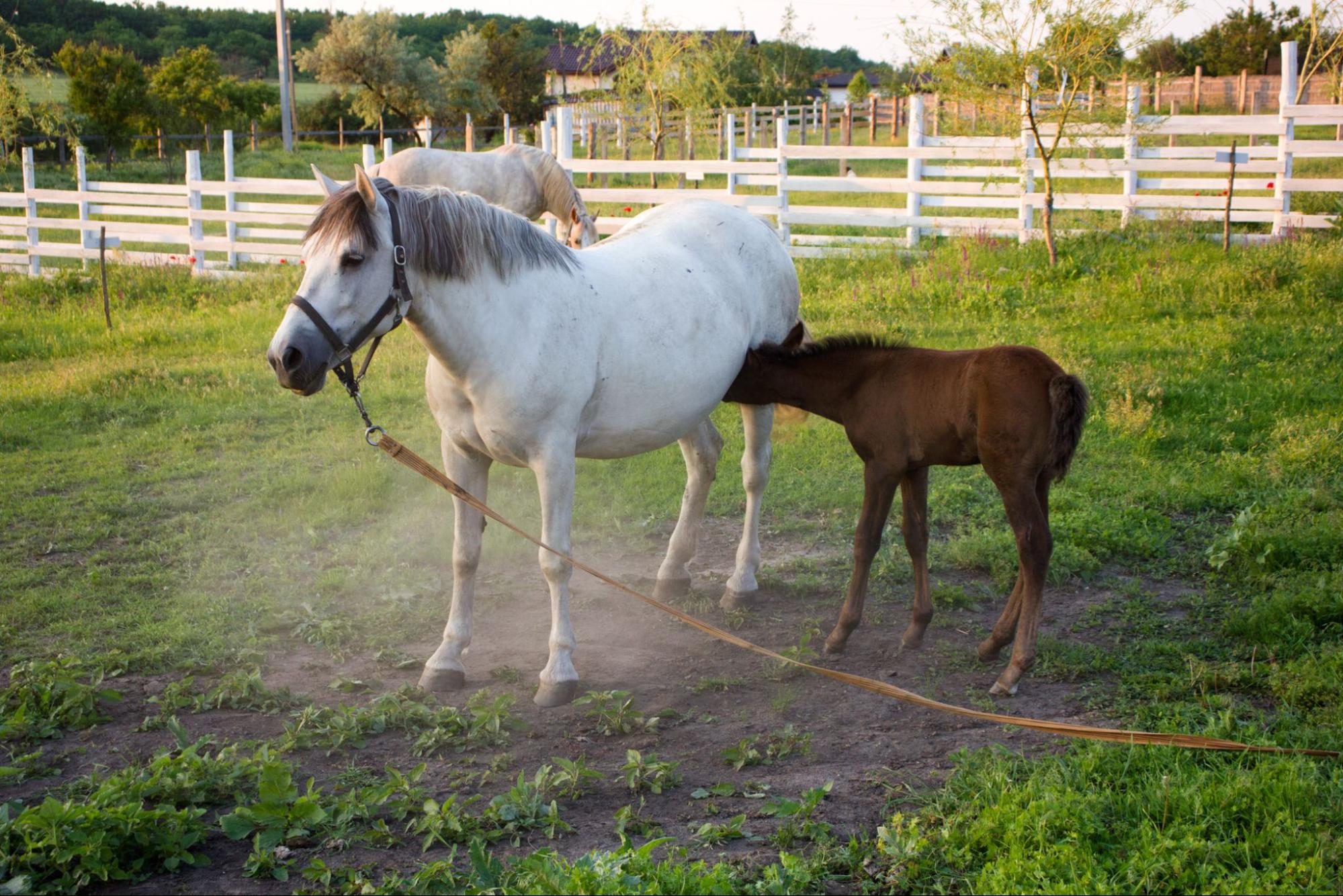
Little foal Shelby does not leave its mother's side
Mamunya, transported from Siversk in the Donetsk region, is not immediately visible, but a couple of goats are grazing nearby. One, with half-meter horns, Mustafa, was also saved from shelling. The goat willingly allows itself to be petted, and touches human hands with its snout, looking for something tasty.
"This is my youngest daughter's favorite animal. She says: 'I love Stafa.' Ulya does not pronounce all the syllables yet," Movchanova smiles.
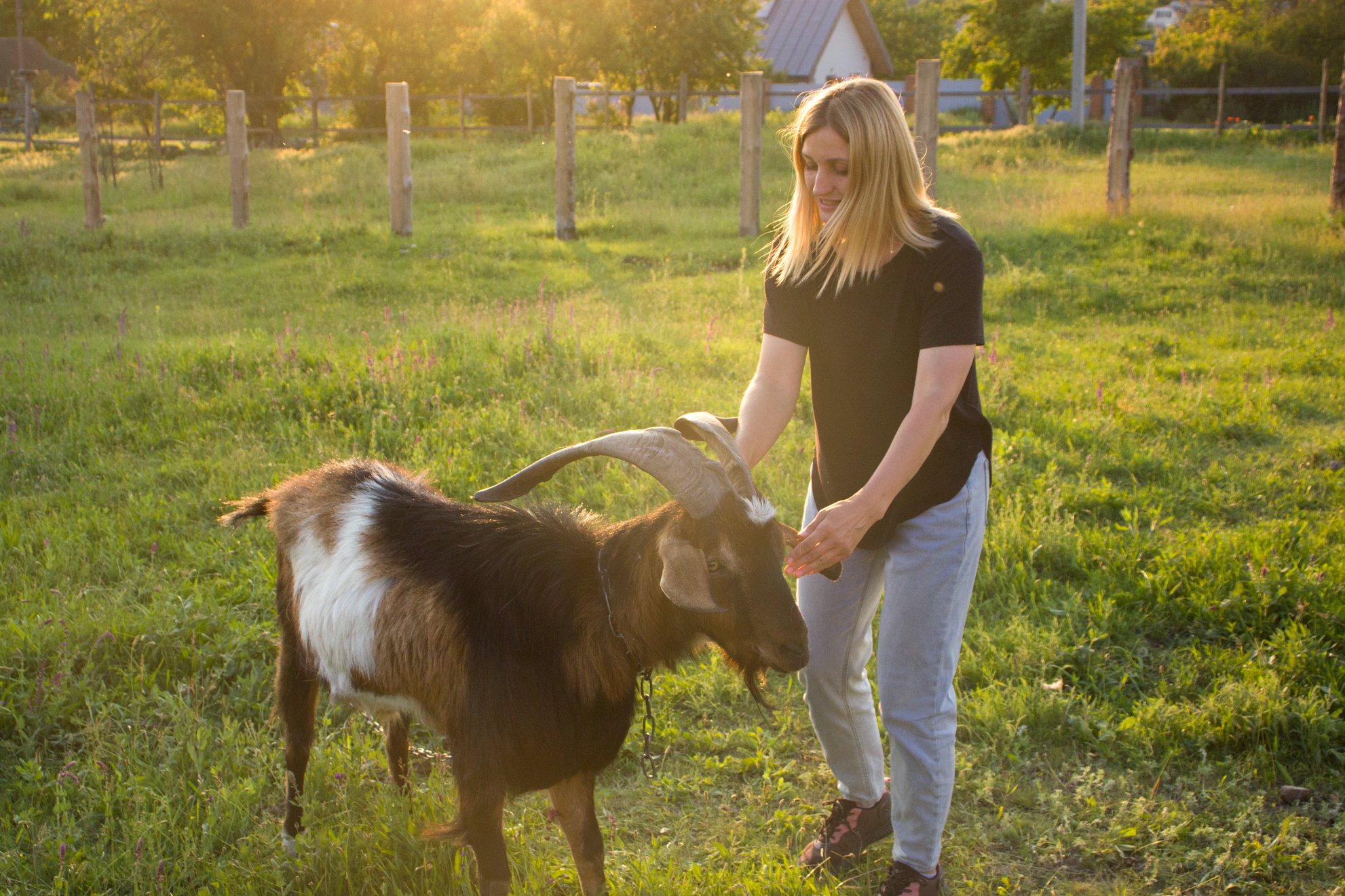
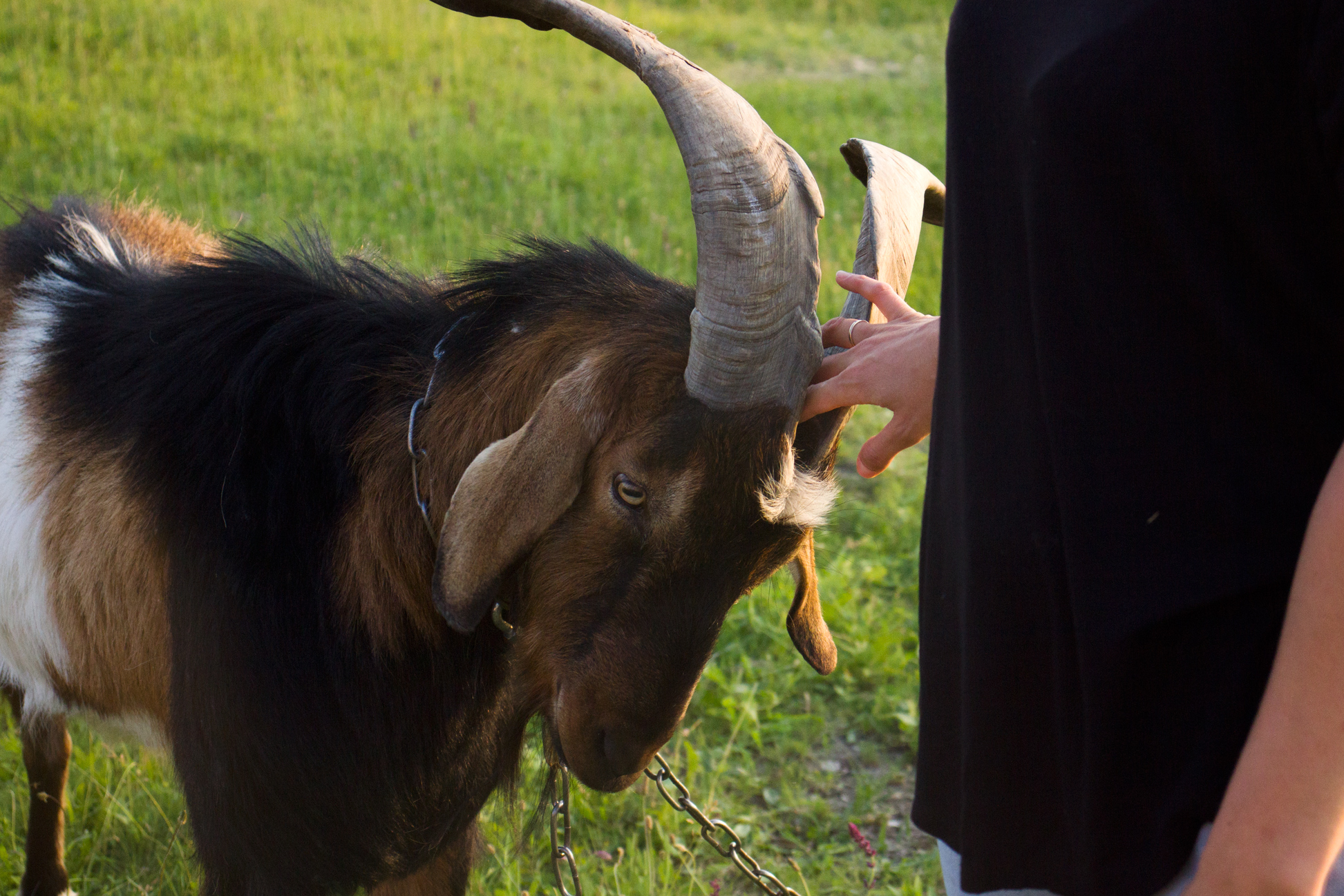
Mustafa is nuzzling up to Movchanova
There are compact enclosures nearby with many animals inside. "An interesting story happened. A military friend brought goats from the front line a few months ago, since they were butting the equipment. One of the goats gave birth. I posted an Instagram story and wrote to my friend: 'Congratulations, you have become a mother again.' She calls me back and says: 'How do you know? I found out today that I'm pregnant."
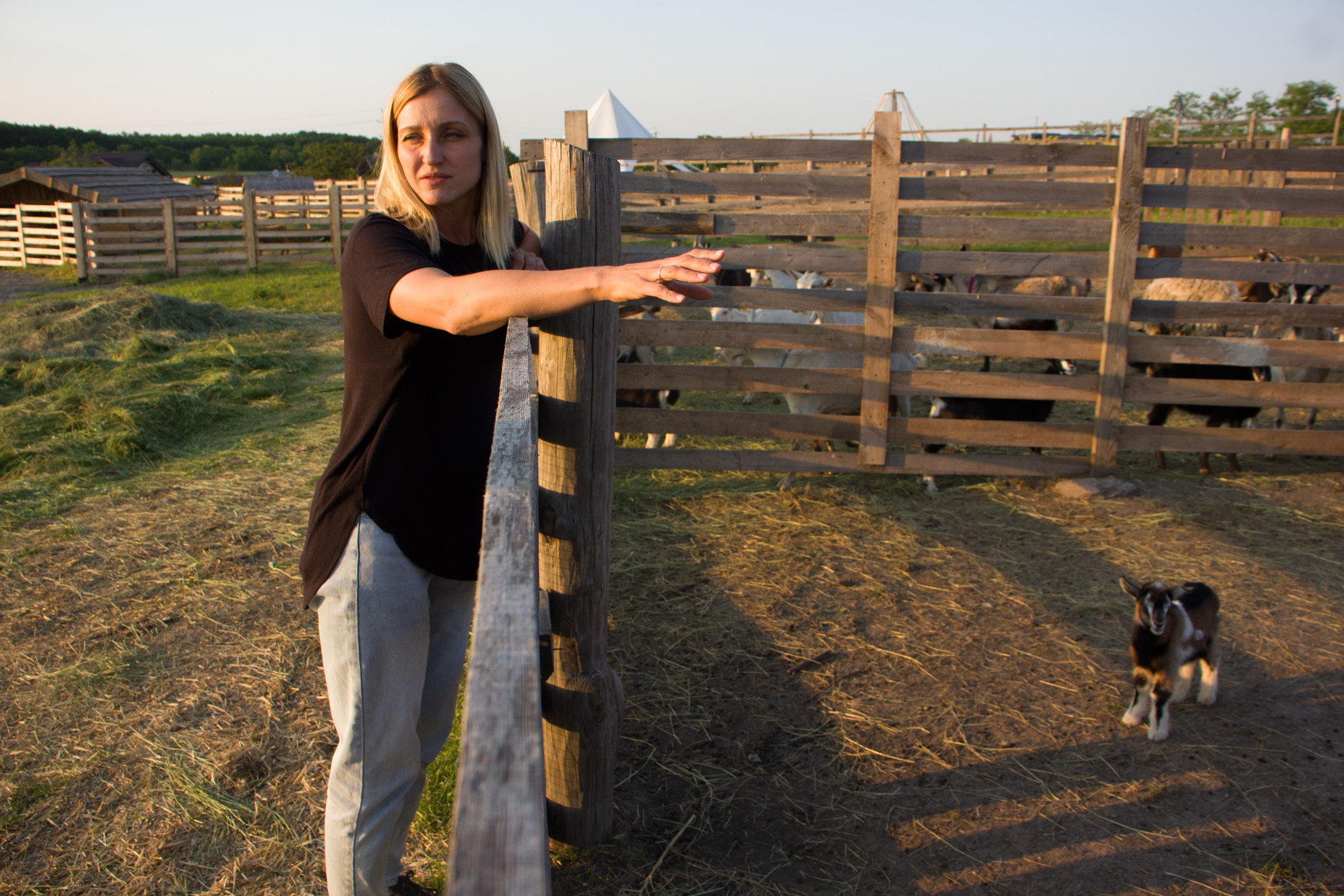
Movchanova is standing near the enclosure with animals
There are many various animals there — from goats to ostriches.
"The locals, when they suddenly saw ostriches there, were very surprised and said they should stop drinking because they were seeing things," Movchanova laughs.
Currently, more than 680 tailed, feathered, and hairy ungulates live on the farm. Over the course of the full-scale war, approximately 1,500 animals have passed through Green Grove. The space has accepted every one who needs help. People who went abroad left their pets here, and volunteers brought animals rescued from shelling to the farm.
"We already have a valley of goats. UAnimals often sends them to us. Dembel is grazing at the entrance — he limps and has warts. He looks like he survived from World War I until today."
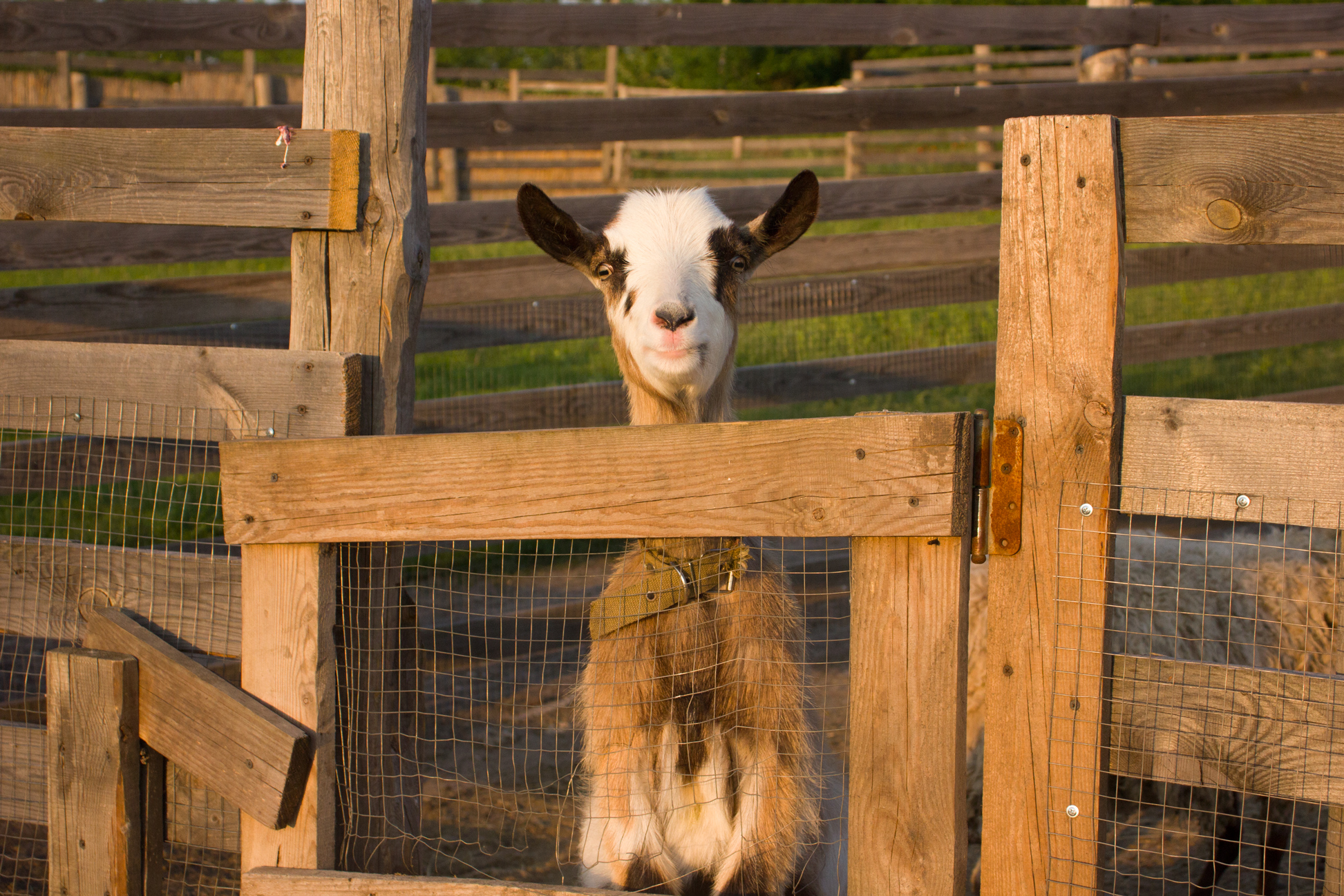
One of the goats looks out to see if there are treats nearby
Where possible, some animals were returned to their owners, while some found new families. Others were transported to farms further across Ukraine, or to special centers. However, many of the rescued remain in Green Grove. Movchanova shows merino sheep, bred in Askania-Nova.
After the sheep, the owner leads to the calves, which live in a small pen behind partitions — Mayor, Kvitochka, and a nameless newborn baby. Then Movchanova takes us to the barn, where she shows dozens of piglets — babies grunt at their mother's breasts, fight, and then sleep sweetly. These babies were already born in Green Grove. Some pigs that were brought here turned out to be pregnant.
Movchanova confesses that pigs and piglets are difficult to deal with. No matter how much you clean, they cause a very strong stench, but all the same. "We want to either distribute all these babies for breeding or sell them — not butcher them, I'm not ready for that."
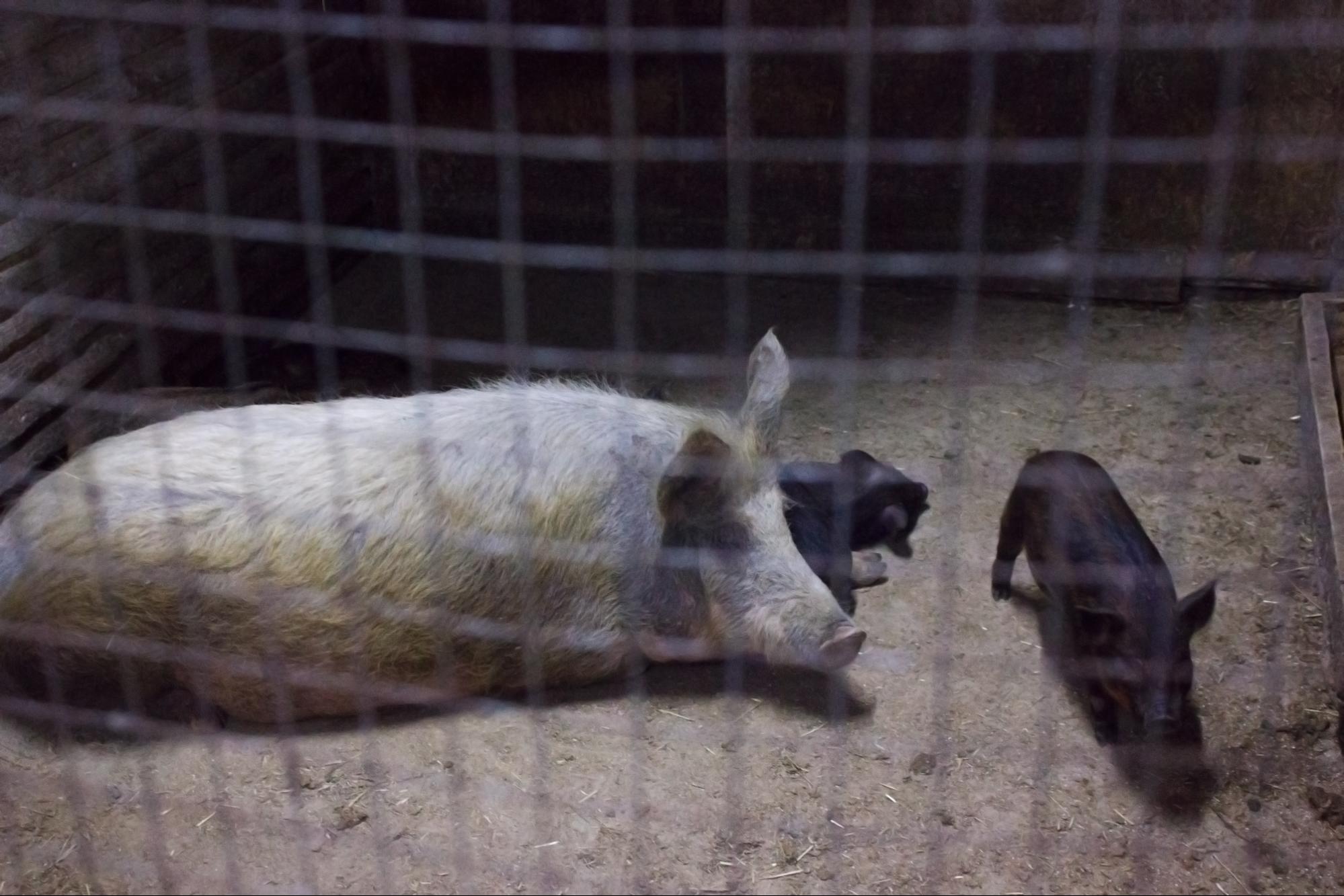
Piglets rest near their mother
In one of the compartments of the barn, we finally meet Mamunya, the donkey from Siversk. The animal was tired of walking, so it came to its own housing unit. She willingly allows herself to be stroked, shifting from leg to leg — three are healthy, and the fourth is a partial amputee.
View this post on Instagram
"We don't know how old she is. The soldiers stationed in Siversk turned to us — they met this donkey with a baby. The animals were caught by a landmine, and the cub got scared and ran away. They could not find it, and Virnist, Dnipropetrovsk zoo volunteers first took Mamunya."
Thanks to them, an operation was performed on her damaged leg, and then Green Grove took the animal. Many shards of shrapnel were discovered, two operations were performed, and the Ilizarov apparatus was installed to correct deformity in a leg. The animal's body began rejecting metals on the device, and almost died.
Movchanova calls Mamunya perhaps the most intelligent animal on the farm, who understands everything without words. As we leave the barn, the owner says that a a prosthesis is being made for Mamunya in Washington, and the animal will be able to walk on all four legs, giving some relief to the wounded donkey.
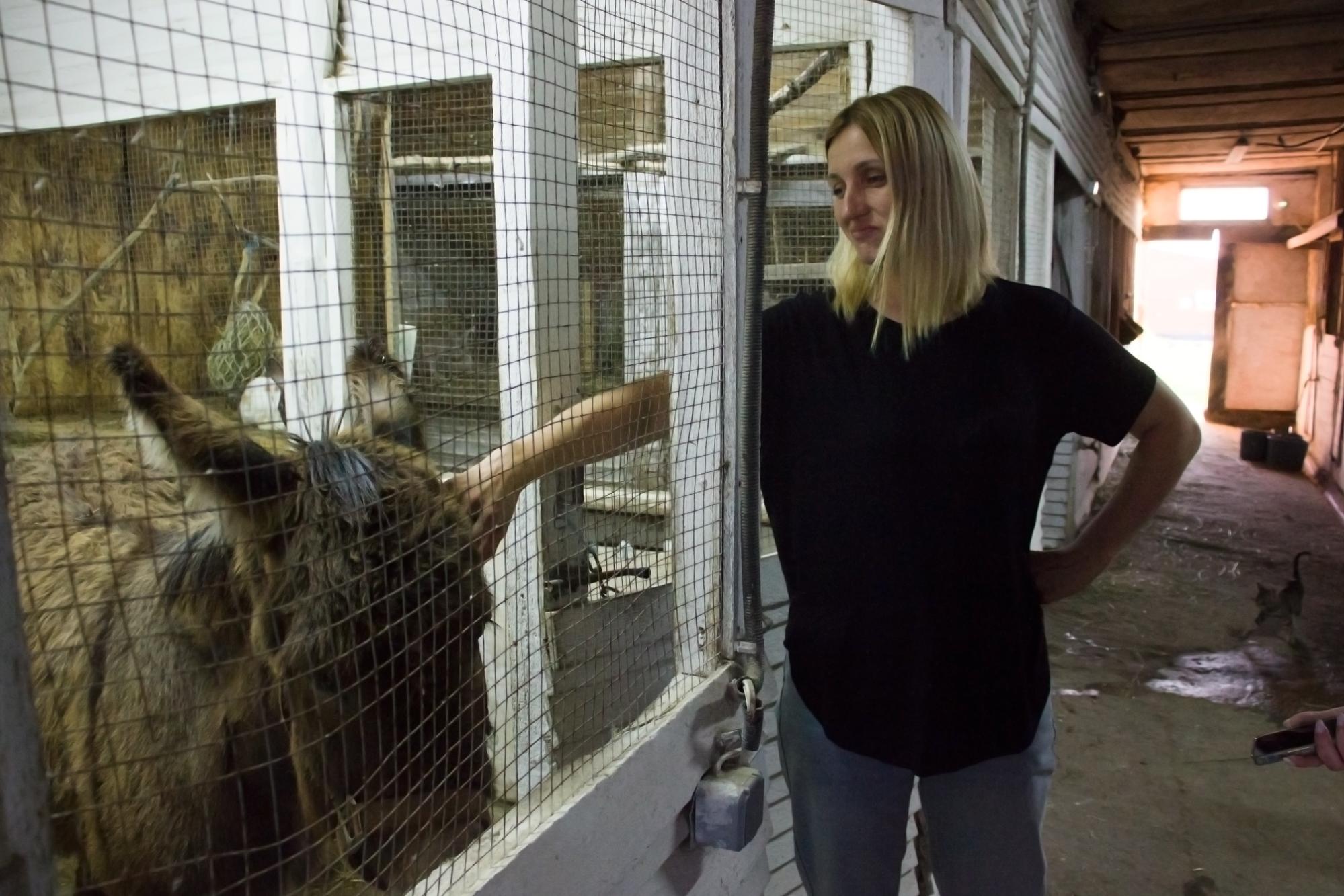
Movchanova caresses Mamunya, who was already going to rest
The origins of Green Grove
The farm, which now has hundreds of animals, once started with a few rams and ponies in 2014. The Movchanovs liked the scenery of the village. They were running their own business and participated in the anti-terrorist operation in the east of Ukraine. When they bought a plot of land near Dnipro, they began to clear it and build a house.
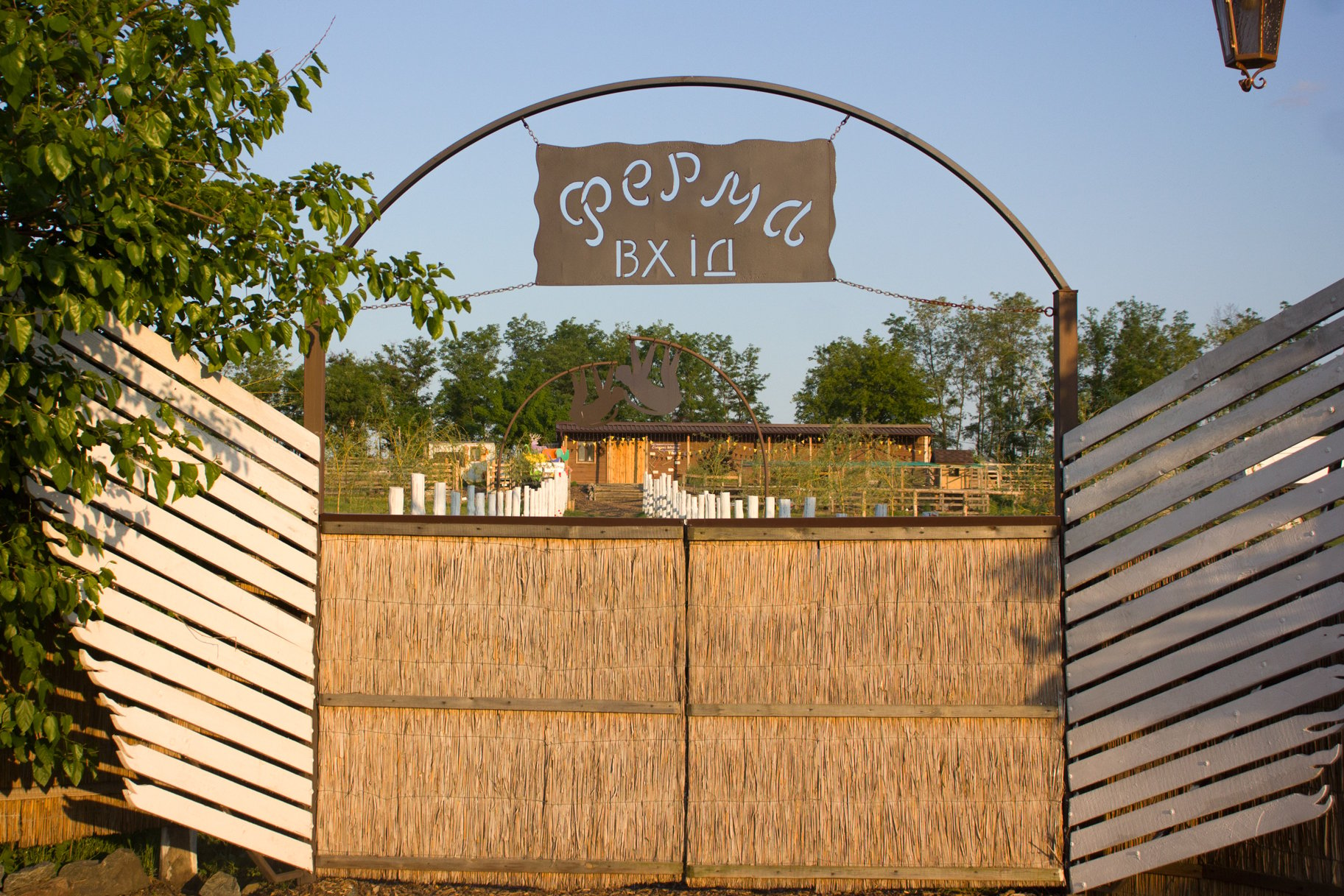
In 2023, the Green Grove farm turned two years old
The sheep were the first to settle on the future farm. The couple bought them in a nearby village, where the animals were tied to stakes driven into the ground. Then, the pony that Movchanovs' daughter wanted appeared, followed by mules destined for the slaughterhouse.
The couple lived in Czechia then. They fully relocated to the village during the COVID-19 lockdown, and decided to stay for good. The more effort they put into arranging their estate, the more they fell in love with the land, and the Ukrainian village in general. Movchanova was finally able to pay more attention to her hobby — making cheese.
"One of the first ones in Green Grove was probably caciotta with herbs. It was a time when we mostly lived in Czechia. I boiled the cheese and left it to stay. Through the cameras, I watched as our guard in gloves turned almost the only head in the refrigerator," Movchanova recalls. "We arrived in Ukraine and, finally, cut that cheese. It seemed to me then that it was at that moment that he really fell in love with me. What did he do next? Made me a cheese factory. What is left for me to do? Cook cheese!"
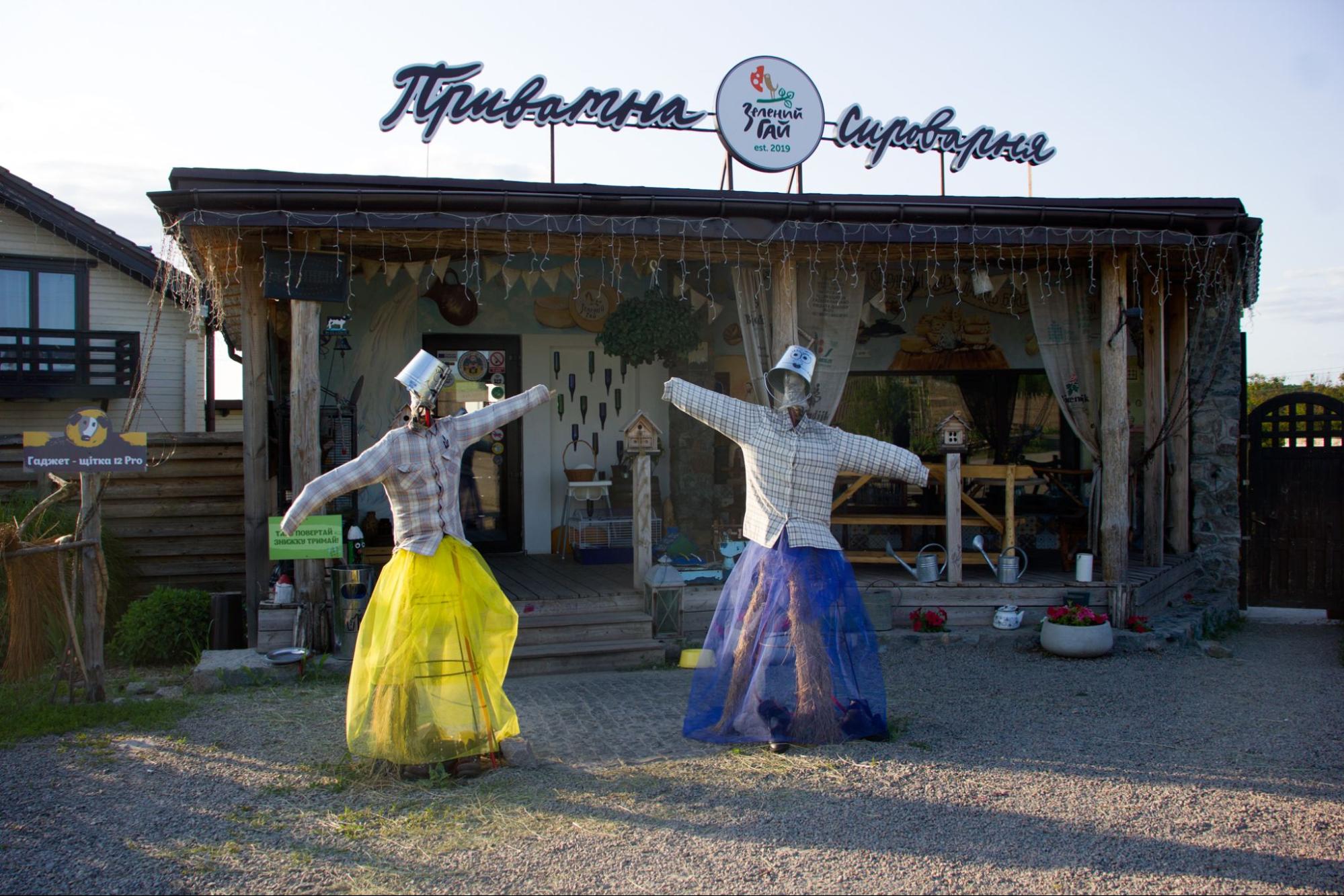
Anyone can buy cheese at the farm
Currently, Green Grove produces more than 50 types of cheese. They are completely different, with different additives — from nettle to pepper.
Currently, the farm has twenty cows of the Jersey breed, one of the best dairy cows in the world. During the full-scale war, the farm produced extra-class milk, considered the best.
"Probably no farm can boast that it has cow's, goat's, sheep's, and donkey's milk simultaneously," Movchanova told Rubryka.
Nowadays, the owners want to increase the amount of milk to make more cheese.
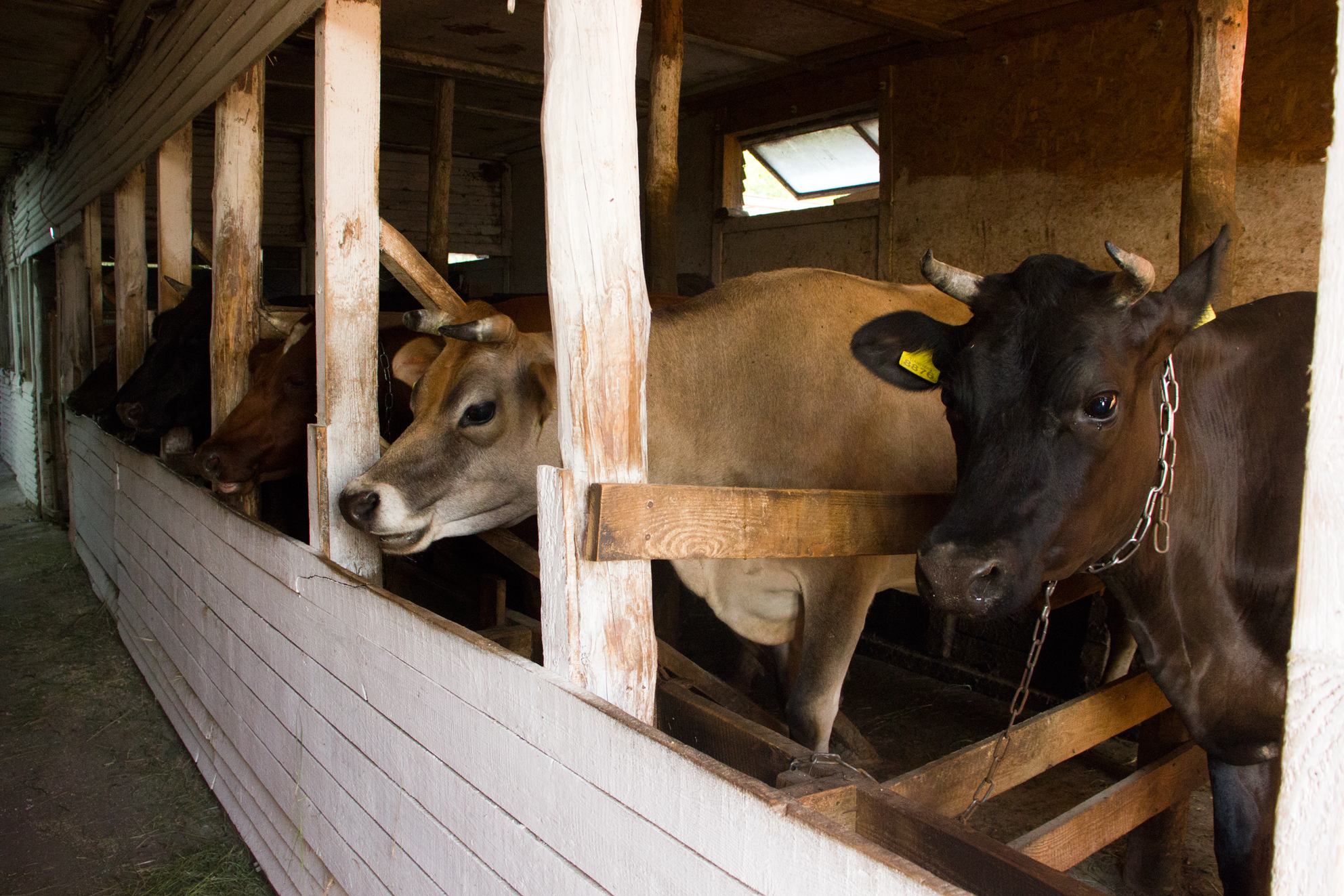 Cows that live in the Green Grove
Cows that live in the Green Grove
Hotel complex for cows
"This will be a Rixos for cows," Movchanova smiles and shows the new barn — it was not here last year, the idea of its construction appeared in the summer of 2022. Currently, the premises are being prepared for opening so that the Green Grove livestock can move to it. Here the cows will live with a beautiful view — they will be facing the sunset, and the equipment will allow for lowering the curtains. Movchanova laughs: "Our house doesn't even have such a beautiful view. I envy the cows."

Movchanova shows a special tile on the floor
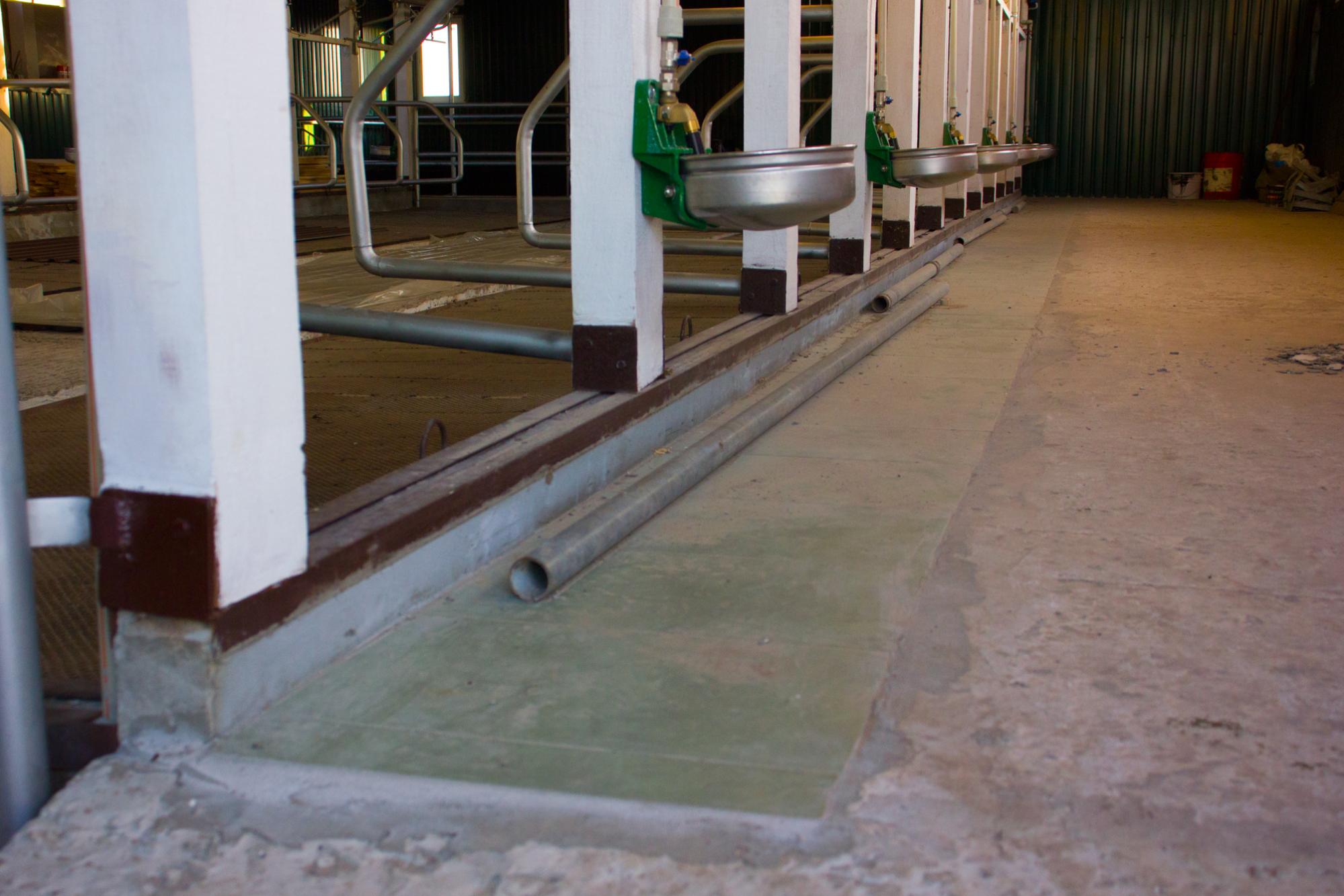
For the horned inhabitants to have a good appetite, a special green tile was placed on the floor, imitating a green meadow. For several weeks, they were looking for it all over Ukraine — the tiles were sent by subscribers from their cities.
"We invested about $54,000, and the Canadians provided another one and a half million worth of equipment," Movchanova shares.
The cows will be in this room, and other animals will be placed in the next room. The farm will be able to receive a higher number of victims, although now there are fewer of them than in 2022 because the front line has stabilized.
Currently, Green Grove is trying to attract more grant funds, after already winning about $9,200.
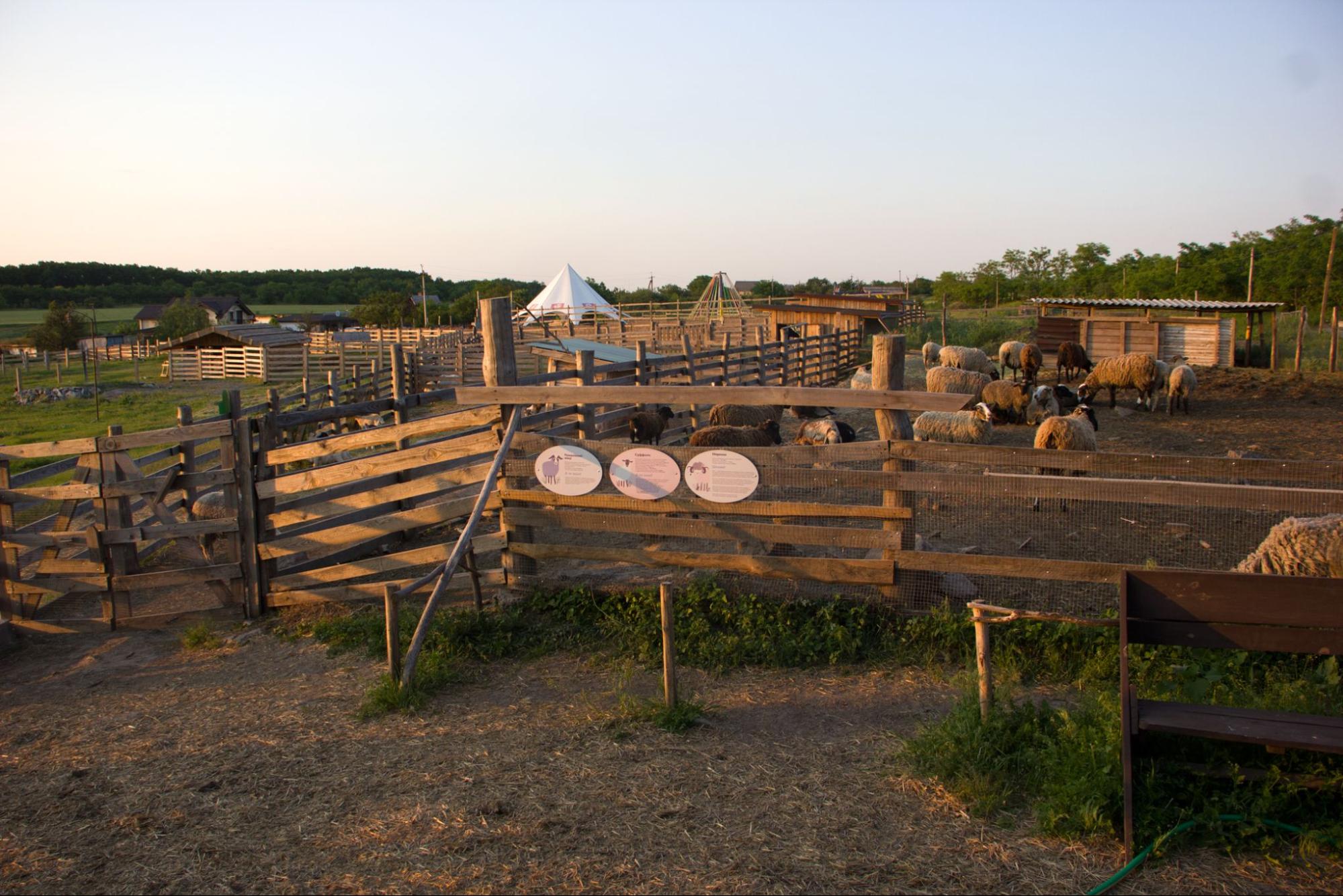
Green Grove enclosures for animals
"We won a grant for $2,7-00. We will spend them on buying a feed mixer, which costs $7,000. We will contribute the rest of the funds from our own savings," the owner shared with Rubryka. "Imagine – my first car was cheaper, but this way, we will prepare food faster because it is easy to make food for one cow with our hands. But if there are twenty of them…"
The woman shows the semi trailer nearby and explains that it is used for transporting black gold — meaning cow dung. It was also partly paid for with grant money from Germany.
Almost all grant projects required additional financing from the owners' pockets. To complete the construction of the farm and prepare fodder for the winter, they took a loan of $27,000.
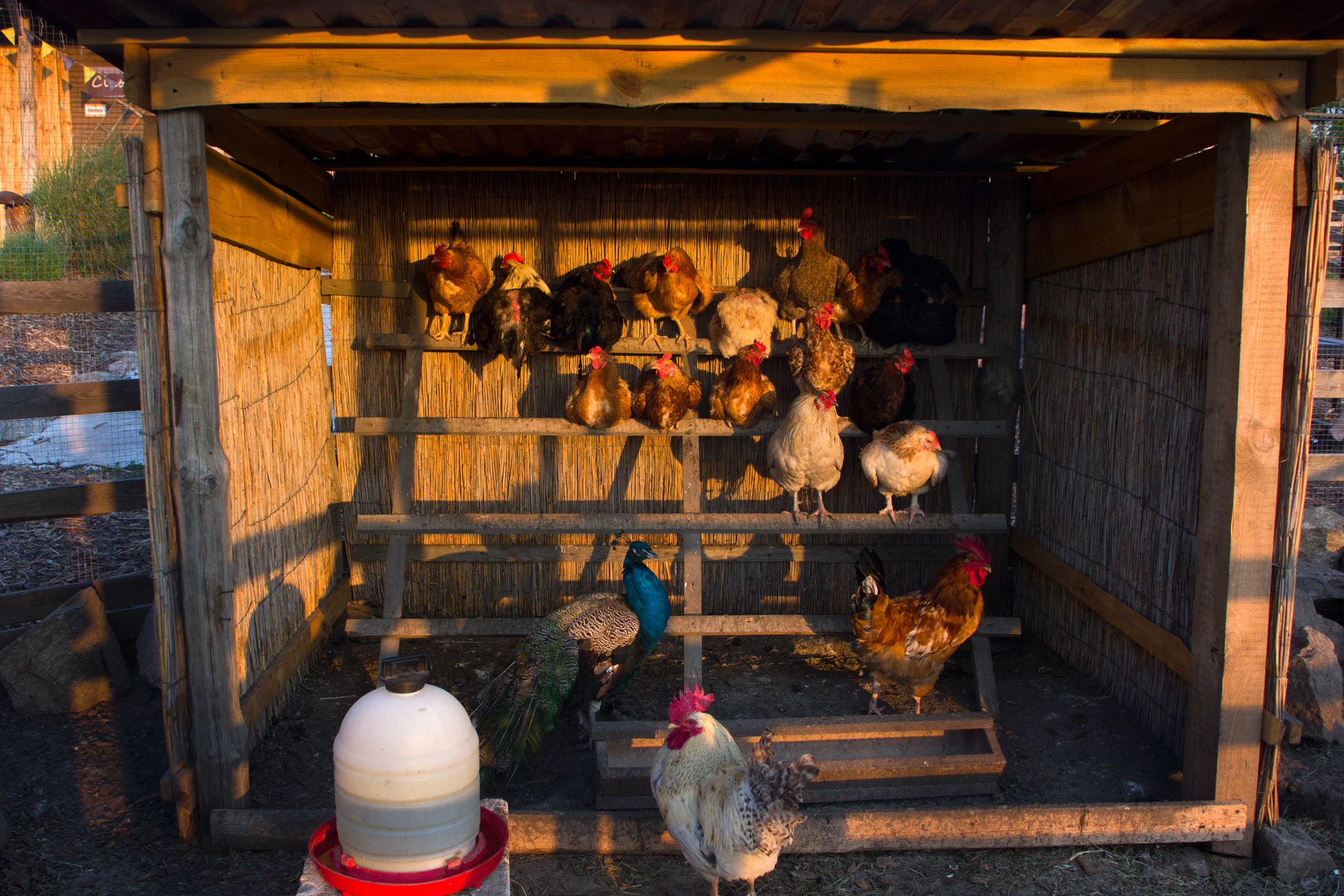
Chickens and roosters are resting together with the peacock
"This is how you live, and it seems that nothing changes. You just constantly run somewhere, do something, and put in effort. You still don't have time, and you need everything… Yes, Dashka?" – she says, turning to the dog with the call sign "DShK," as he wags his tail.
Currently, Green Grove is working to make the farm carbon-free — one that has no emissions and does not pollute the environment.
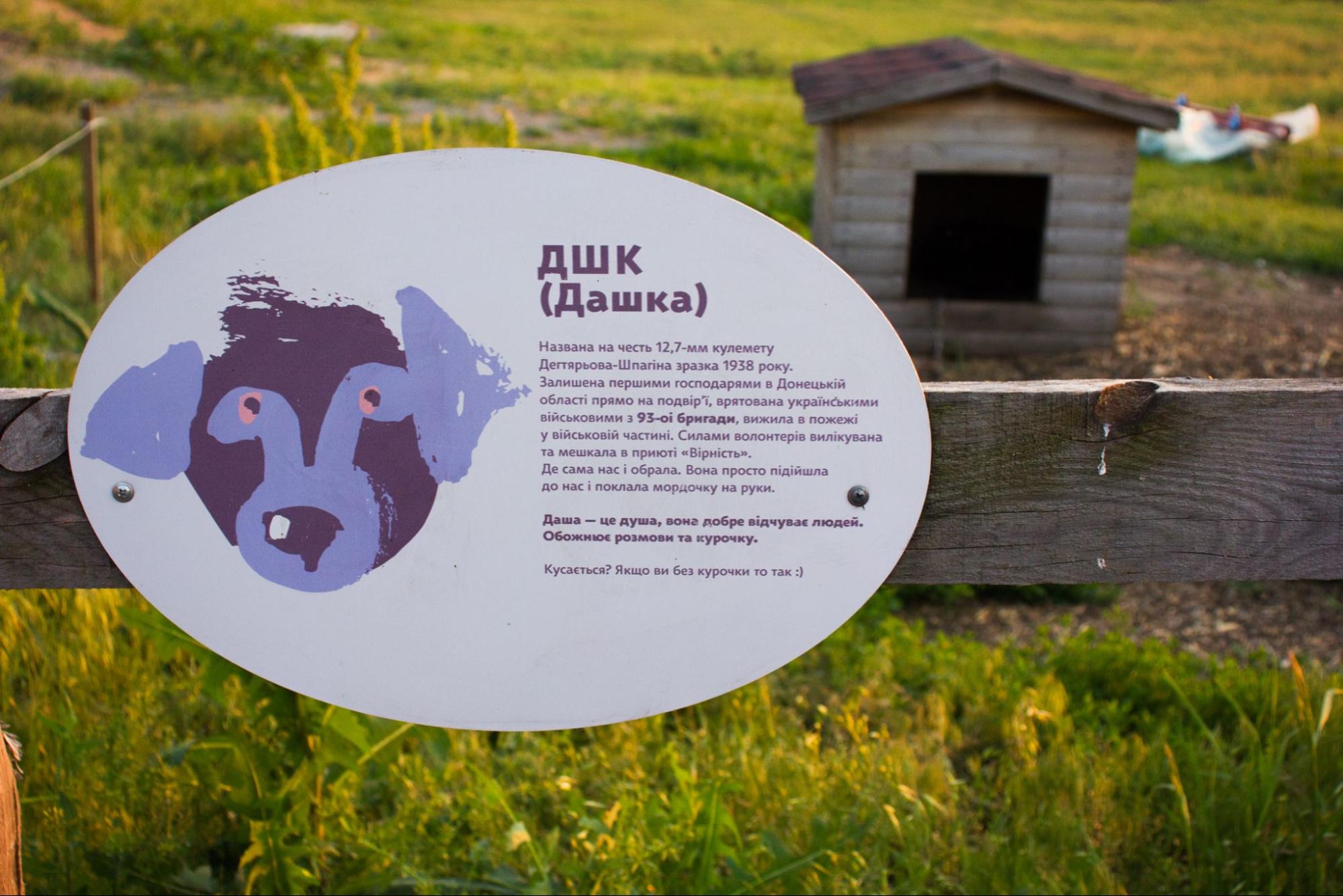
The dog with the call sign DShK rests in a kennel
Absence of sirens, and help from people
The siren does not sound on the farm because it can cause harm to the animals taken out from areas under shelling, and those who come here for rehabilitation. More than 3,000 underwent animal rehabilitation here from the beginning of the full-scale invasion until April 2023. There is also a rehabilitation center in Green Grove for military personnel.
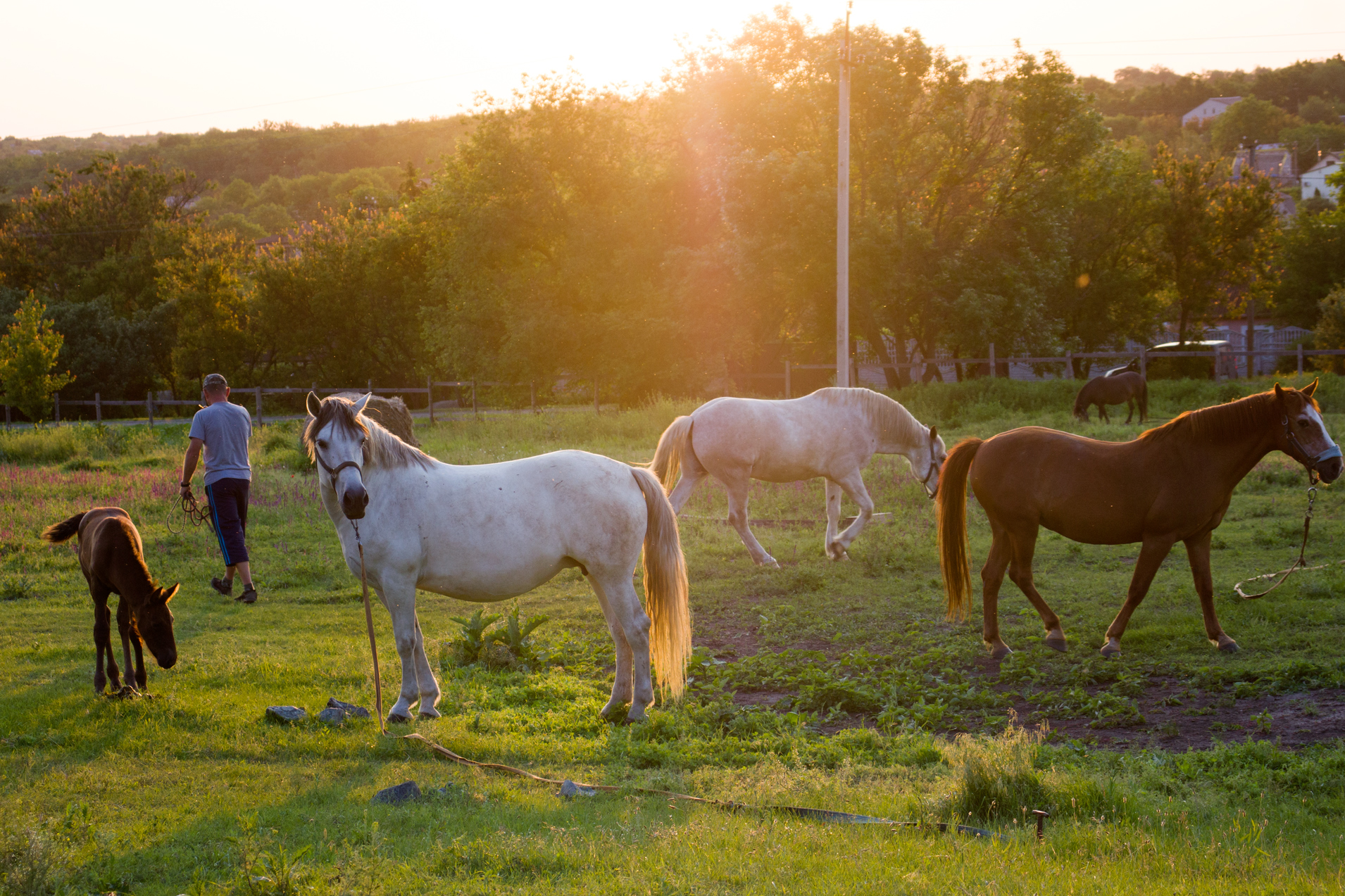
The horses of Green Grove have returned from the pastures
"We spend a lot of time studying and working with horses, dogs, and various human injuries and undergoing certification," Movchanova shares.
They also studied with specialists from the Israeli zoo and have been working with animal therapy for 23 years, but mostly specialize in reptiles.
The farm is now a relatively safe environment, even though Dnipro often suffers from shelling. In September 2022, debris from the rocket caused a big fire that destroyed part of the farm's enclosures, building materials, and fodder.
"Only that week, our glass was broken from shelling. I have three boxes by the door filled with enemy shrapnel. Sometimes, after shelling, we collect it on the farm's territory, but thank God, the Air Defense Forces know where we are, and what needs to be done. We 'bribed' them with cheese," Movchanova laughs.
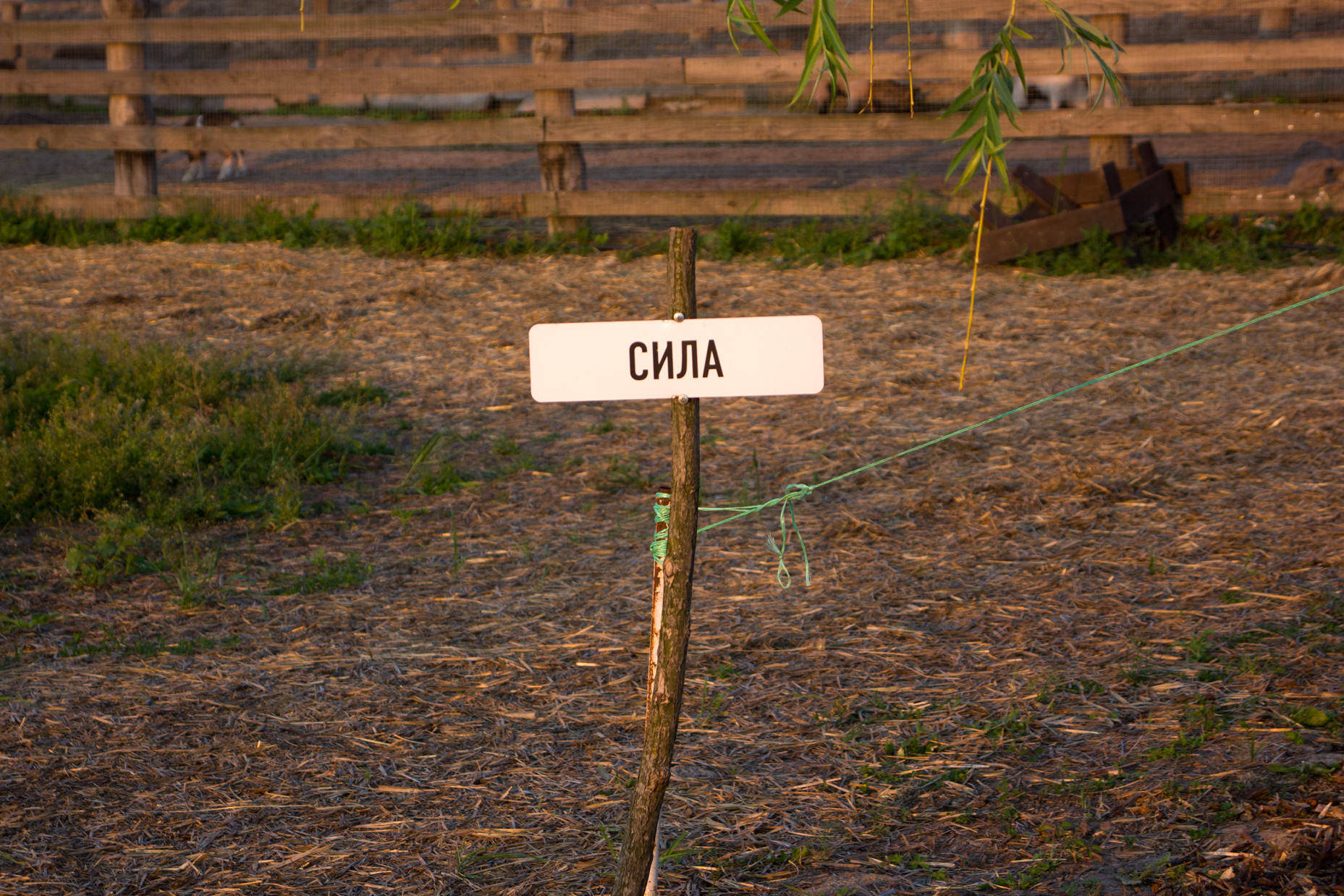
A place of strength in the Green Grove
After the September fire, they collected money to rebuild the farm. Now, Movchanova says, they don't give out their banking details for donations because they want to earn money for keeping all the animals themselves. Visitors can sign up for a cheese-tasting tour, use camping, ride horses, or go kayaking in Green Grove. Hosts are adding paid services to make the business more viable.
"Now there is no large number of free options as before. We realized that it is impossible to evacuate, help animals and people, engage in rehabilitation — and do it all for free. We need to set priorities."
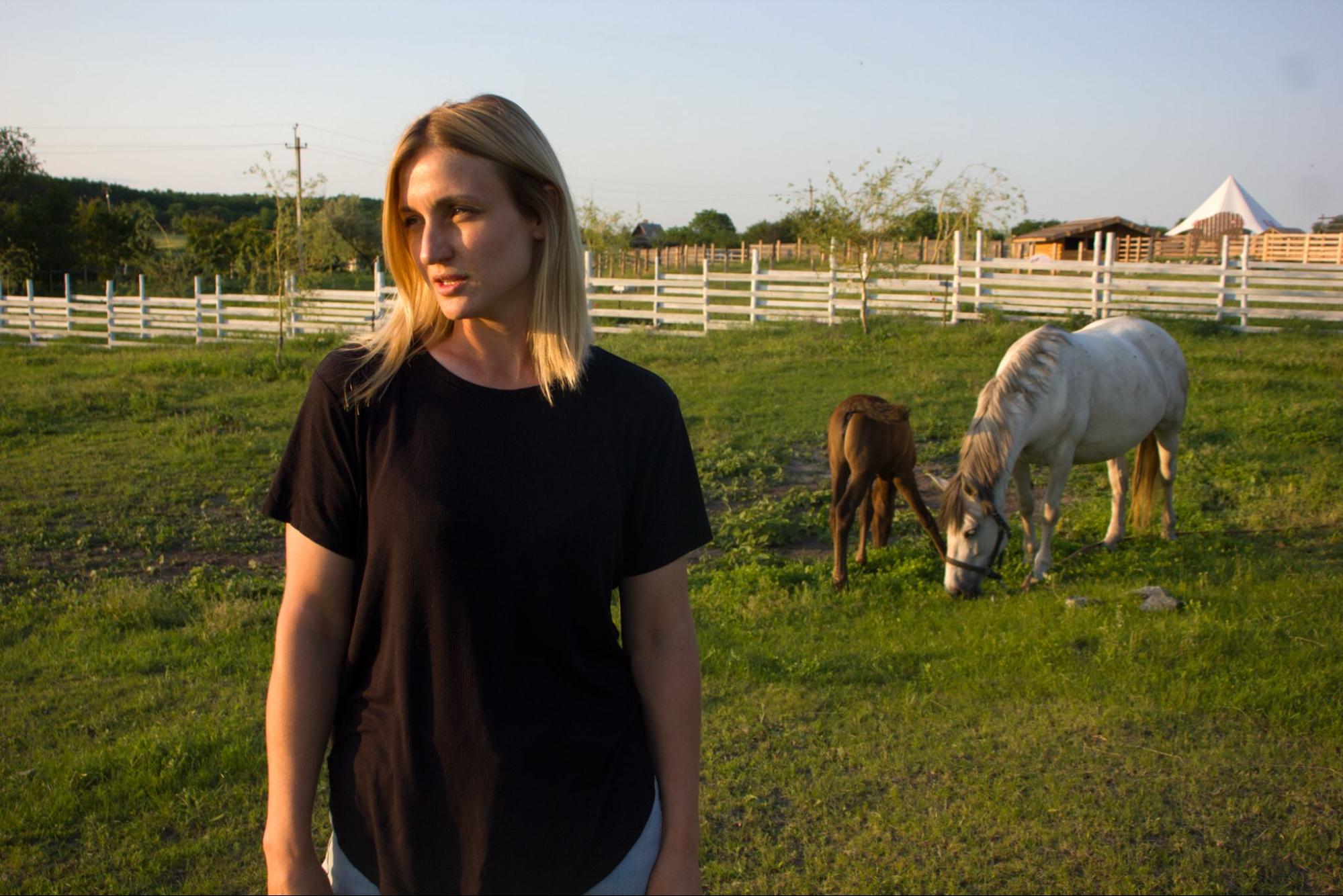
Movchanova continues the tour of the farm
Over the past few years, the hosts have also faced criticism and slanders for their work. In the spring, claims arose that the farm was polluting the nearby river. Authorities came to Green Grove for inspections, but no violation was found.
"What's interesting: I wrote a post about this slander, and on that day, people signed up for the excursion two months in advance. Counter-advertisement worked, and people only supported us. My brother calls from the front line and asks: 'How are you?' And I answer that I am ashamed to tell him about our affairs."
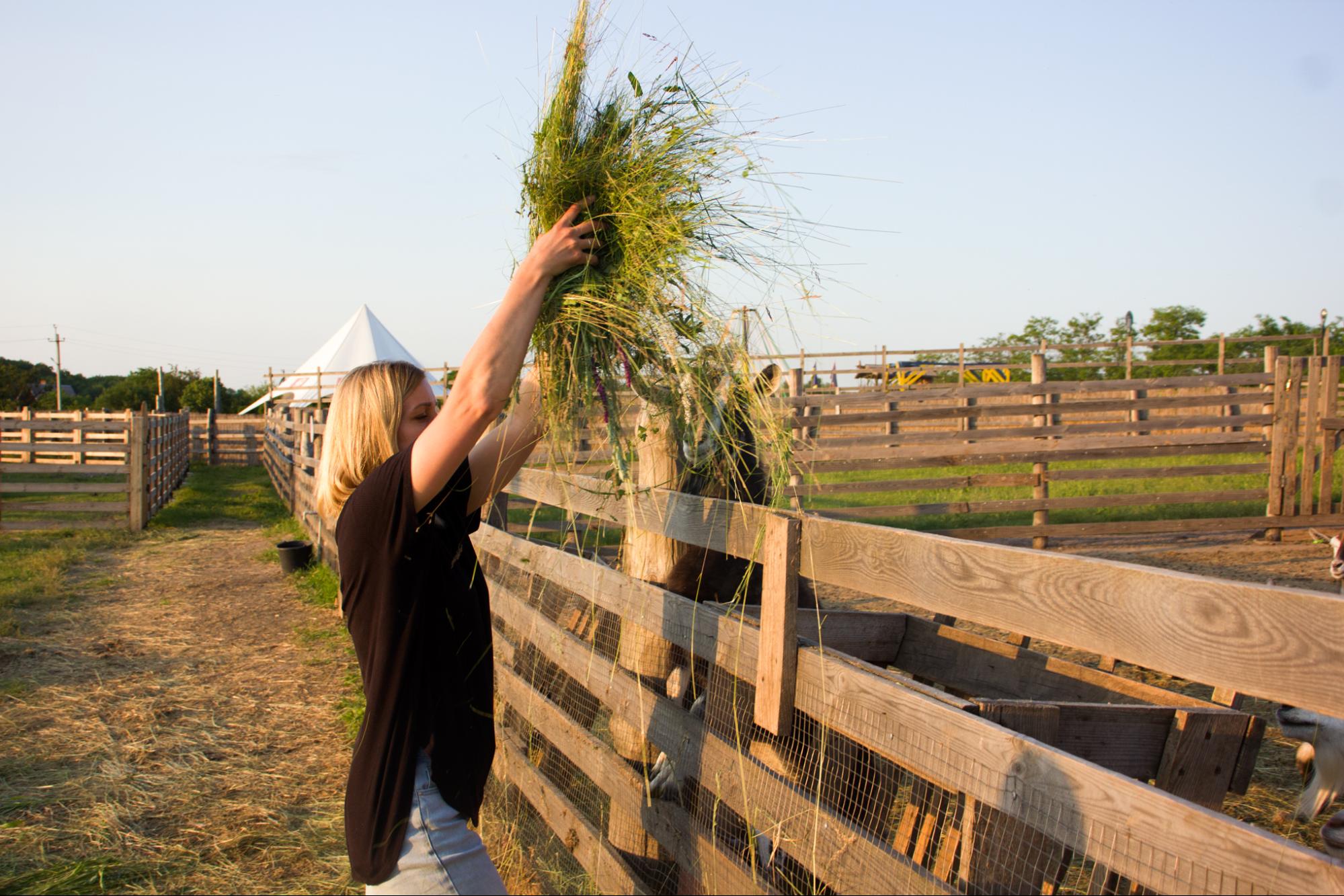
Movchanova feeds the animals in the pens
Green Grove's own rehabilitation center
Currently, 16 people work on the farm, and many caring people help with whatever they can. The couple does not shy away from any work. The couple was recently treated for a hernia caused by overwork, and until just a few weeks ago, she could barely stand.
"Doctors tell me to reduce my workload, and how can I do it? If Mamunya has the surgery, she may fall at any moment, so I hold her."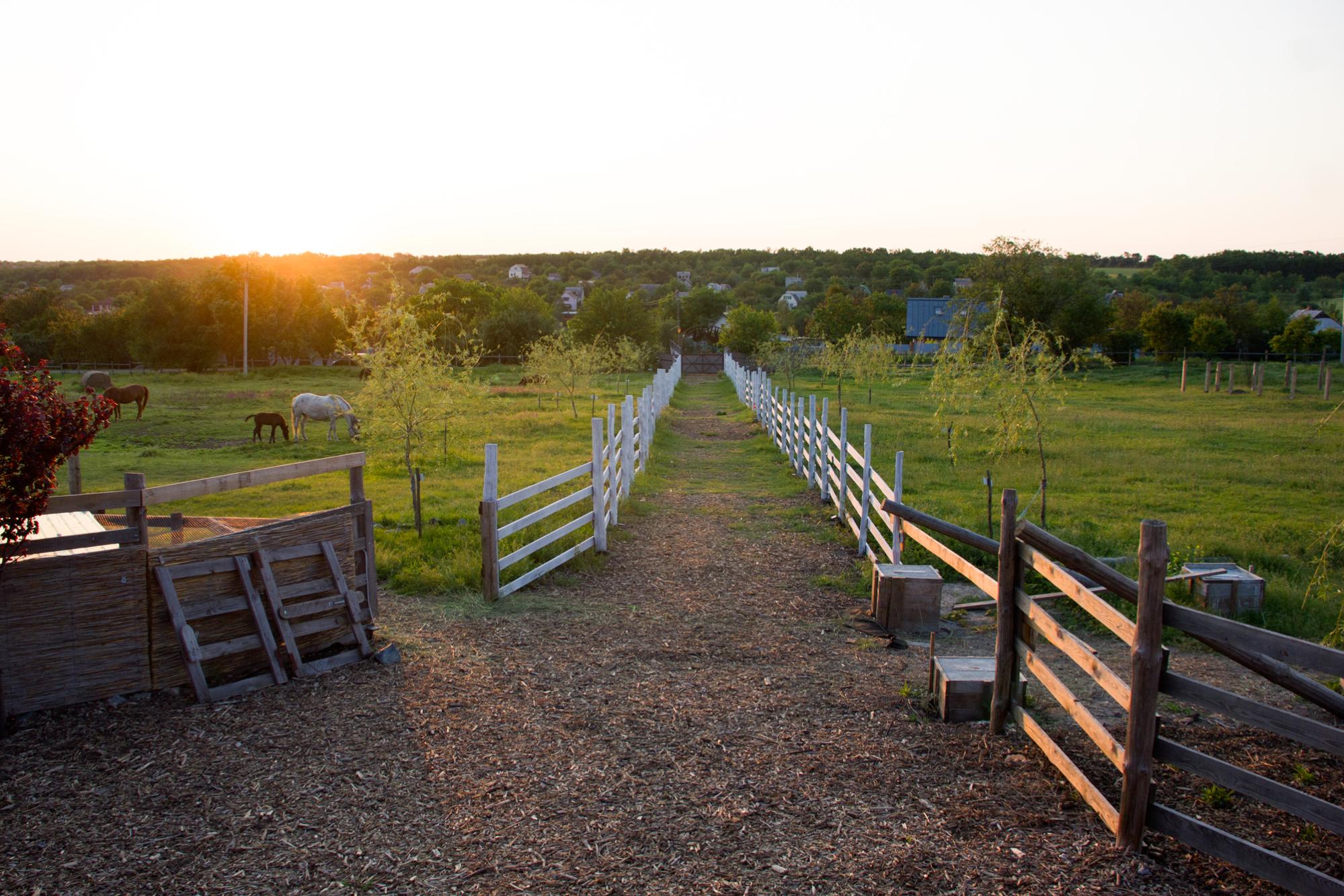 Green Grove is waiting for its visitors
Green Grove is waiting for its visitors
In parting, Movchanova hands out a few pieces of caciotta — almost the kind she once made as one of the first – the only difference is that the one she first made several years ago, was with herbs, and this one is plain.
"It's been a long time, but we only recently realized that the entire Green Grove appeared as our own rehabilitation. A person adapts best to circumstances when creating something in a safe zone. In this rush, we forgot about all our problems, and I would like people to see the prospects in the Ukrainian village visit and raise it up. There are opportunities here – you just have to see them," Movchanova says proudly.
Photo: Oleksandra Tkach


